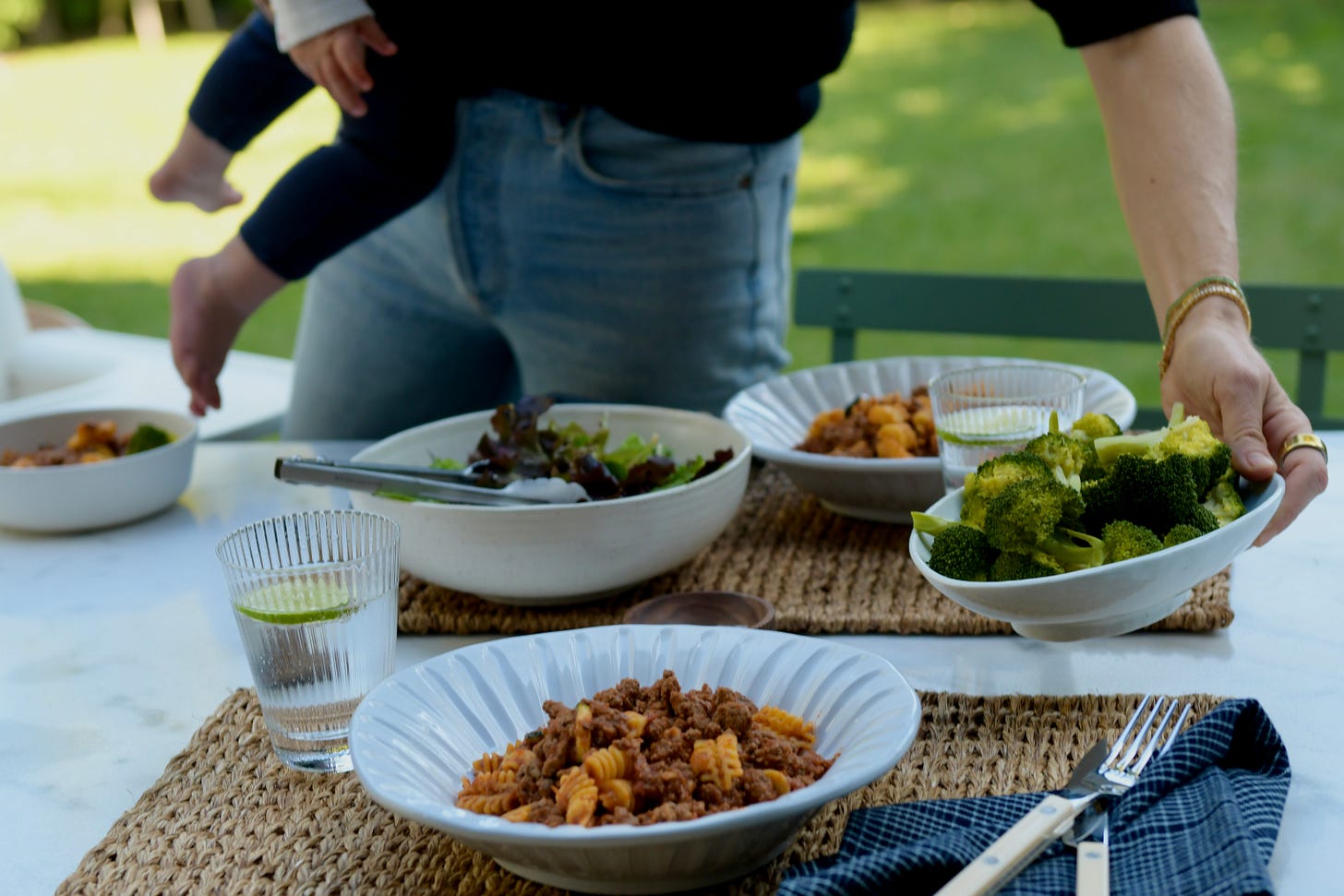Hello readers,
Before we get into it, an announcement: our subscriber chat is now for paid subscribers only. It’s a place to ask questions, share how you’re doing, and support one another on our respective wellness journeys. We will have deeper conversations on popular nutrition topics plus an Ask Me Anything thread so you can get my thoughts on a new granola or protein bar, nutrition in the news, or find a plastic-free salad spinner (I bought this one).
For today’s email, I’m opening up an Ask Me Anything in the comments section. I know the topic of weight loss can be nuanced and fraught, but I will try to answer your questions as best I can. This post is free for all readers, but if you would like to Ask Me Anything anytime, please consider upgrading your subscription:
We’re living in a weird time. For many reasons, but for today we’ll limit our conversations on weirdness to our complicated and twisted relationship with weight.
As a nutritionist, I’ve seen the cultural shifts in diet culture play out in real time. When I started over a decade ago, many of my clients would come to me with a very specific weight goal. They knew exactly what they wanted to weigh and how many pounds they needed to lose to get there. For most of them, this had been a arduous journey of trying diet after diet and program after program with no real long term results. And from a cultural perspective, the idea of “health” was often disjointed from the desire to be thin—they were two separate things.
Next came the era of body positivity and intuitive eating. After decades of failed diets shoved in our faces, we’d had enough. It was a cultural coup–screw those 90 calorie snack packs, I’m just going to get a muffin if I feel like it. Seeing a more "normal” range of body types represented in the media was a breath of fresh air and positive on all levels. But now, popular nutrition guidance was less centered around physical health and more focused on the mental strain of diet culture. Anything suggesting an avoidance or limitation of certain foods could be considered restrictive and diet-y, even if it was for health. To be fair, I think everyone was over it and needed a break. But, in my client work, I found a consistent undercurrent of shame around wanting to lose weight. It was now taboo to try to be thin and “healthy” became a new code word for trying to lose weight.
And then Ozempic hit the market and it seemed like the body positivity movement vanished into thin air. Models on the runway, celebrities photographed at the gas station or accepting an award now seem thinner than ever before. Dieting outsourced. Don’t get me wrong, I think there’s a time and a place for these drugs. I have clients and friends that have really benefited from them, but this idea that the drug takes away the need to focus on what you put in your body is just wrong. Nutrition still matters.
In fact, it seems a little silly to have to say this, but nutrition is about more than the pursuit of thinness. For some reason, the concepts of nutrition and weight loss don’t always intertwine on the societal level (or even at the doctor’s office). So, if you want to lose weight, that’s great—let’s do it. And if you’re confused, I don’t blame you. But don’t fall into these traps of diet culture’s past.
Here are the three biggest mistakes I see people make when trying to lose weight:
1. Weight loss as the primary motivator.
Weight loss is a great goal but a terrible motivator. It takes time and a shocking amount of consistency to lose weight and keep it off, and there will always be situations and circumstances where your weight loss ambitions don’t align with what’s going on in your life at the moment. It’s hard to make decisions for your future self when you’re tired, rushing out the door, or in a bind. Find other motivating factors that have more immediate consequences, like digestion or energy levels. If you make the journey about how you feel now versus how you want to feel later, you’ll be more likely to stick with it.
2. “Eat less, move more” – a reductionist approach.
It’s true that you have to be in a caloric deficit to lose weight, but this old weight loss adage of “eat less, move more” will only make you hungrier. Once that primal brain feels like it needs food, you will not win that battle, no matter how prepared you are. I often hear clients complain about how their day starts out well but they end up making choices later in the day that aren’t aligned with their goals. This might include aimless snacking in the afternoon (what I call “snack purgatory”—when you’re neither satisfied nor hungry but can’t stop) or being overly hungry at dinnertime because of an insufficient meal or snack. Another common scenario: being “good” during the week, but losing it on the weekends or feeling out of control with your eating habits once an “off-limit” food is introduced.
Instead of trying to limit portion sizes or skip meals, focus on ensuring you’re getting enough of the good stuff—meeting your protein and fiber goals, eating a variety of vegetables, drinking plenty of water, getting good sleep, you get it. It might seem like you’re eating more at the moment, but you’re almost guaranteed to snack less and feel a more rational level of hunger at your next meal.
3. Obsessing over the scale.
The scale only gives us one part of the equation and, when trying to lose weight, neglects a really important component of your health: muscle. Instead of obsessing over the scale, focus on your body composition. I wrote all about this in the beginning of the year, but ladies (and men), we do not want to lose muscle. Most of the time, when people go on a 90s-style diet, they likely lose equal amounts of fat and muscle, but when they gain the weight back, it’s mainly fat. This is not good for you. Slow and steady weight loss is great, because ideally you will be maintaining or increasing muscle mass. And muscle replaces fat. This is a much more sustainable way to lose weight. If you’re taking a weight loss drug, increasing protein and resistance training is shown to preserve muscle. This is what I mean when I say that nutrition still matters.
Some closing thoughts:
I’ve had a lot of success helping my clients lose weight, but it’s always been just one of many health and wellness goals we’re working on. When you can align the way you live with the goals you’ve set for yourself it’s much easier to stay consistent and get results.
Remember: you are an adult—you can eat whatever you want. There are no rules. But what is it that you truly want? I’ll speak for myself here (and many of the clients I’ve worked with over the years), but I don’t want to have some rigid diet where I can’t try the food at a cool restaurant or am stressed about what someone might cook for dinner. I mean, just to fit into a pair of jeans? Hard pass. These relics of diet culture can be difficult to break (and spoiler: don’t work), but when you can find that in-between, the grey area in which you have good routines set up to help you eat well for your body and promote good health outcomes while also enjoying life and being able to go with the flow—that’s it. That’s the work. And, in my experience coaching many many clients through this over the years, the work works better, too.
A desire to lose weight is often a front for a real desire to feel more confident, energetic, less boated, and more vibrant, Focus on overall health and feeling good in your body and you will settle into a comfortable weight. And, all of the sudden that validation we seek from a random number on the scale tends to become less important.
Please drop your questions and thoughts in the comments below, and, if you liked this post, give it a heart or share with a friend! Your engagement will help Btwn Meals gain more visibility, so I can spend more time writing these posts. And, if you want to discuss working with me 1:1, here is the link to learn more.
xx Mia










As a Holistic Health Coach this is one of the best articles I have read, ever! You articulated the weight loss challenge so well and gave excellent advice on how to live, healthy first and if desired to lose weight!
Thanks for this post, am sharing with my husband. We have been on a wellness journey together the past few years and have reached the point where it feels like our new lifestyle.
My question is about “challenges” like the Whole 30, which we just finished, and also exercise challenges like training for a 5K, etc. How can we occasionally do these things without tilting into being disordered about it? I love the information I learned about my body and food from doing the Whole 30, but felt consumed with guilt over a homemade pop tart this morning. The answer could just be “don’t do them” and that is awesome. Am just wondering if there’s a mindful approach to these that can help. My husband LOVES challenges.
Thanks!